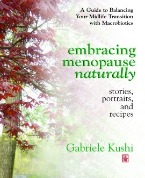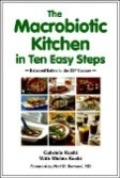Macrobiotic - A Diet and lifestyle For a Healthy and Peaceful World
The goals of Macrobiotic are the realization of planetary health and happiness, world peace and human evolution.
(Georges Ohsawa, founder of Macrobiotic.)
Macrobiotic, derived from the Greek word macrobios (large life), is associated worldwide with living and eating in harmony with nature. Macrobiotics embraces the 5,000-year-old philosophy of yin and yang, wherein yin represents expanding energy and yang contracting energy. Yin and yang are the building blocks found in all phenomena in varying proportion. Scholars have classified the relationship of yin and yang in many phenomena, including: season, food groups, body types, organs and meridians and so forth.
What is a macrobiotic diet?
The Macrobiotic Diet embraces traditional foods that people ate before the dawn of our modern civilization. Thus, the macrobiotic diet emphasizes natural and whole foods such as whole grains, greens and root vegetables, sea vegetables, legumes, beans and bean products, seasonal fruits, seeds, nuts, vegetable oils, fermented food, and optional small amounts of wild animal foods. These foods eaten in season support a healthy body and a peaceful mind.
The following foods, although mostly eaten in modern societies, should be greatly reduced or avoided, as these seem to contribute to sickness, aggression and disharmony.
excess animal foods (meats, dairy, eggs, honey, fish),
excess refined and processed products (sugars, white flour, refined grains)
excess stimulant foods (nicotine, coffee, spices)
A variety of cooking techniques such as steaming, pressure cooking, sauteing, baking, juicing, sprouting, pickling, soaking, fermenting or raw are used to enhance the nutritional value and seasonal energy of food. The macrobiotic diet provides guidelines (proportional as well as food-wise) that can be modified depending on one's individual health, personal needs, climate, environment and other considerations. Thus it differs from a vegetarian/vegan/raw diet, which does not take such considerations. In the context of disease treatment, or for more detailed guidance regarding dietary change, it is recommended that individuals seek advice from a qualified macrobiotic health consultant.
Daily Kushi macrobiotic dietary suggested guidelines for a temperate climate:
- 20% - 30% or 40-60%) Whole Grains: Major portion of whole cooked grains like short- and medium-grain brown rice, sweet and wild rice, millet, spelt, barley, oats, kamut, quinoa, wheat or corn. Minor portion of whole grain sourdough bread or other baked whole flour products, pasta and flakes.
- 30% - 40% Vegetables: Green leafy vegetables, including collard, kale, broccoli, nappa cabbage or mustard greens; root vegetables such as daikon, carrots and burdock; and round vegetables, preferably cabbage, onions and squash.
- 5% - 10% Legumes and Beans: Chickpeas, aduki, lentils, white and black soybeans, tofu or tempeh.
- 3% -5% Sea Vegetables: Nori, wakame, dulse and sweet water algae daily. Arame, hiziki and kombu three times per week.
- seasonal & locally grown fruits, seeds, nuts, homemade pickled vegetables and raw foods like vegetable juices and salads.
- small volume of seasonings, fermented foods and condiments such as sea salt, miso, soy sauce, gomasio, umeboshi vinegar and plums.
Why do people choose to eat this way?
Millions of people on this planet are actively practicing macrobiotic principles, and its dietary benefits have been published in numerous scientific and medical journals. Because the macrobiotic diet may prevent and protect against degenerative disease, it may be the best diet to follow in this time of high cancer rates, heart disease, obesity, allergies, and the hazards of environmental pollution. These increased conditions are mostly considered to be a result of our imbalanced modern way of life.
Macrobiotic benefits for the body
Research about the macrobiotic diet indicates that it may benefit people by: reducing high cholesterol, preventing heart disease, reducing cancer risks, assisting with weight management and strengthening the immune system.
Macrobiotic benefits the environment
Macrobiotics supports organic, natural agriculture and natural food processing and production. It raises environmental awareness, while preserving a clean, natural environment and respecting natural and animal life. Macrobiotics promotes natural water conservation as well as natural technologies to purify contaminated water.
Nutritional information about the macrobiotic diet
The American Journal of Clinical Nutrition published a study by Dr. Specker that points out that some sea vegetables may provide sufficient sources of Vitamin B-12 within a very balanced macrobiotic diet (Specker, 1988). It is, however, important to eat balanced meals with all food groups in order to obtain the nutrients the body needs. If for some reason a person cannot always follow a balanced diet, vitamin and mineral supplementation is recommended. Since very few people can make a radical transition from a diet of primarily meat and sugar to a diet based on grains and vegetables, most people make the transition to macrobiotics step-by-healthy-step.
Published - http://www.doitgreen.org/article/food/macroAuthor Gabriele F. Kushi
What is Macrobiotics?
Macrobiotics, noun, (used with a singular verb)
1. a way of life that guides one's choices in nutrition, activity, and lifestyle.
2. a system of principles and practices of harmony to benefit the body, mind, and planet.
– macrobiotic, adj., such as macrobiotic philosophy or macrobiotic diet.
Origin: from Ancient Greek: Macro (large or long) and Bios (life or way of living).
- Definition agreed upon by the International Macrobiotic Conference 2017 in Berlin, with 45 macrobiotic teachers, along with GOMF, SHI, Macrobiotic Association, IMP, IME, Chi Energy, IMS, Kushi's Kitchen and other schools, institutes, and organizations.
Copyright @ 2024 Gabriele Kushi and http://www.kushiskitchen.com provides educational services only, and does not provide medical nor nutritional advice, diagnosis nor treatments.
Through my affiliate links and book links I might earn a small compensation.
By using this website and my services you agree with the Disclaimer and Privacy Policy.
Click to add text...



